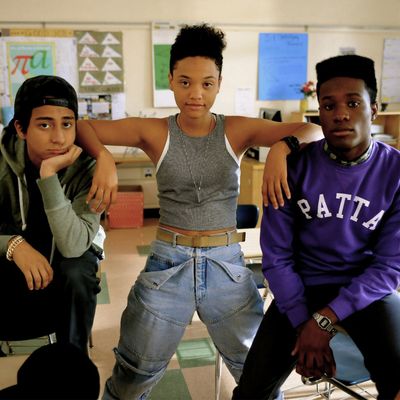
I first saw Rick Famuyiwa’s Dope at this year’s Sundance Film Festival, where its irreverent, twisty-turny, off-the-wall energy landed like a neutron bomb amid the worthy coming-of-age stories and quirky romances and moody ennui. Dope is Go meets Risky Business meets True Romance meets Fingers, with a little bit of Boyz N the Hood and We Are the Best! thrown in. I doubt all those movies were actually on Famuyiwa’s mind — save maybe for Risky Business, to which the film directly alludes — but no matter. Dope wears its referentiality on its sleeve: It’s a remorselessly entertaining, Frankenstein’s monster of pop-culture borrowings and appropriations. So much so that it becomes very much its own thing.
Our hero, Malcolm Adekanbi (Shameik Moore, pure dorky charisma), raised by a bus-driving single mother in the Los Angeles projects known as the Bottoms, is a proud geek. His favorite show is Game of Thrones, he has his own punk band called Awreeoh (with his best friends Jib and Diggy, played by Tony Revolori and Kiersey Clemons), he’s applying to Harvard, and he’s obsessed with ‘90s hip-hop. His world is a mess of references both retro (2 Live Crew, N.W.A, Yo! MTV Raps) and modern (Bitcoin, Twitter, etc.). His attempt to carve out a personal style, to be himself, doesn’t sit well with anybody — not the drug dealers infesting his hood, not the jocks who pick on him at school, not even his teachers, one of whom looks down at Malcolm’s essay proposal, “A Research Thesis to Discover Ice Cube’s ‘Good Day.’” (Malcolm is undeterred: “If Neil deGrasse Tyson was writing about Ice Cube, this is what it’d look like!” he protests.)
Malcolm’s unfortunate series of events kick in when he runs into a drug dealer, Dom (A$AP Rocky), who’s a lot smarter than anyone realizes; he bests Malcolm at classic rap trivia, for starters. That puts Malcolm in contact with the beautiful Nakia (Zoe Kravitz), whom Dom also covets but who has more in common with our college-bound hero than she does with her drug-dealer suitor. Their attraction lands Malcolm at a nightclub party, which then dissolves into gunfire, which in turn leaves him with a book bag full of the drug molly. Long story short (there are many, many more twists and turns along the way), Malcolm and his nerd pals find themselves reluctantly forced into selling the drugs. (“We’re talking about molly,” one of them offers. “All we gotta do is find the white people. Go to Coachella.”) But what about that Harvard application, not to mention the SATs? And the band? And the iPad-app-enabled drug dealers chasing them? And what will Nakia think?
Dope isn’t perfect. It’s got a couple too many endings, and it loses the romantic subplot for a distressingly long time. To some, its breathless referentiality — the dialogue and soundtrack and imagery a nonstop stream of pop-culture in-jokes and digressions — may feel inchoate, simplistic, cheap. But it’s not the individual references that matter; it’s the whole, crazy patchwork of adolescent longing, ambition, and fear they weave. Malcolm, it could be argued, is little more than a collection of influences and tastes — but, nowadays, aren’t we all? As the film tackles everything from celebrity in the age of social media, to how Amazon’s business model relates to the narcotics trade, to who can use the N-word and who can’t, to the double standards that govern academic achievement, to the meaning of authenticity in a world governed by prefab expectation, it replicates the breakneck speed and whipsawing back-and-forth of modern life. It’s an ideal movie for a world where we all dance on the nervous edge between catastrophe and grandiosity.
But for all its speed and snark, Dope does occasionally settle down and offer up passages of genuine, heartfelt beauty. At one point, Malcolm boards a bus driven by his mother and dreams of the film’s various characters — friends and nemeses alike — quietly getting on at each stop and gently bopping their heads to Gil Scott-Heron’s “Home Is Where the Hatred Is.” If Federico Fellini had directed Superfly, he might have come up with a scene like this. God damn, I loved this film.





